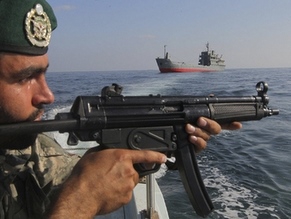|
World Jewish News

A military personnel participating in the Velayat-90 war game on Sea of Oman near the Strait of Hormuz in southern Iran December 28, 2011. Photo by: Reuters
|
Obama secretly warns Iran against closing Strait of Hormuz, report says
13.01.2012, Israel and the World The administration of President Barack Obama used secret channels to warn Iran against closing the Strait of Hormuz, the New York Times reported on Friday, amid recent tensions over the possible closing of the strategic waterway.
Earlier this week, Defense Secretary Leon Panetta said that the U.S. would act if Iran were to develop a nuclear weapon or close the Strait of Hormuz.
Also referring to recent tensions over the waterway, through which passes a fifth of the world’s supply of crude oil, Chairman of the Joint Chiefs of Staff Gen. Martin Dempsey said on Sunday that that Iran has the military power to block the Strait of Hormuz "for a period of time" if it decides to do so, but that the U.S. would take action to reopen waterway. "We can defeat that," he said.
Panetta said closing the strait would draw a U.S. military response. "We made very clear that the United States will not tolerate the blocking of the Strait of Hormuz," he said. "That's another red line for us and ... we will respond to them."
On Friday, the New York Times reported that Obama used secret channels to warn Iran’s Supreme Leader Ayatollah Ali Khamenei against closing the strategic waterway, saying that such a move was a “red line” that would prompt a U.S. response.
According to the report, U.S. officials indicated that the clandestine communication was chosen to privately stress to what extent Washington was concerned over the Strait of Hormuz.
The New York Times cited Navy officials as indicating that the U.S.’s greatest fear was that an Iranian military official would undertake a provocation of his own, a move that would spark a larger confrontation.
This most recent report regarding Iran’s standoff with the West came after a confidant of Prime Minister Vladimir Putin said on Thursday that Russia feared Israel would push the United States into a military conflict with Iran which could retaliate by blocking oil shipments from the Gulf.
"There is a likelihood of military escalation of the conflict, towards which Israel is pushing the Americans," Nikolai Patrushev, who heads the Kremlin's Security Council, told Interfax news agency.
He also said he believes Western countries are getting close to launching a military intervention in Syria, in an attempt to undermine Iran's regional standing.
Patrushev, a former head of the main successor to the Soviet-era KGB, said Tehran could respond by blocking the Strait of Hormuz between Oman and Iran, through which 35 percent of the world's seaborne traded oil passes.
"It cannot be ruled out that the Iranians will be able to carry out their threat to shut exports of Saudi oil through the Strait of Hormuz if faced with military actions against them," Patrushev said in an interview published on Thursday.
Haaretz.com
|
|
